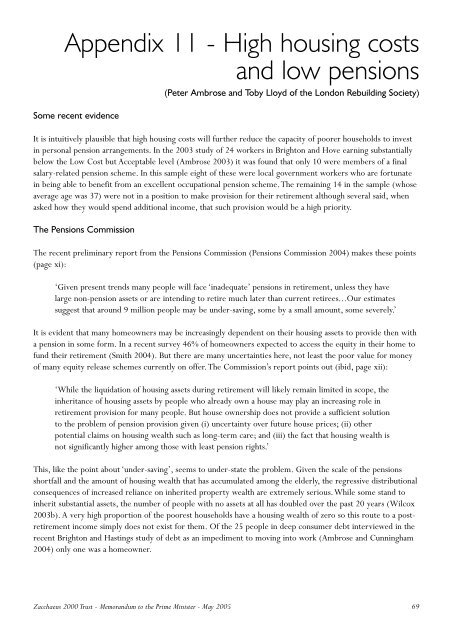Memorandum-to-the-Prime-Minister-on-Unaffordable-Housing
Memorandum-to-the-Prime-Minister-on-Unaffordable-Housing
Memorandum-to-the-Prime-Minister-on-Unaffordable-Housing
You also want an ePaper? Increase the reach of your titles
YUMPU automatically turns print PDFs into web optimized ePapers that Google loves.
Appendix 11 - High housing costs<br />
and low pensi<strong>on</strong>s<br />
Some recent evidence<br />
(Peter Ambrose and Toby Lloyd of <str<strong>on</strong>g>the</str<strong>on</strong>g> L<strong>on</strong>d<strong>on</strong> Rebuilding Society)<br />
It is intuitively plausible that high housing costs will fur<str<strong>on</strong>g>the</str<strong>on</strong>g>r reduce <str<strong>on</strong>g>the</str<strong>on</strong>g> capacity of poorer households <str<strong>on</strong>g>to</str<strong>on</strong>g> invest<br />
in pers<strong>on</strong>al pensi<strong>on</strong> arrangements. In <str<strong>on</strong>g>the</str<strong>on</strong>g> 2003 study of 24 workers in Brigh<str<strong>on</strong>g>to</str<strong>on</strong>g>n and Hove earning substantially<br />
below <str<strong>on</strong>g>the</str<strong>on</strong>g> Low Cost but Acceptable level (Ambrose 2003) it was found that <strong>on</strong>ly 10 were members of a final<br />
salary-related pensi<strong>on</strong> scheme. In this sample eight of <str<strong>on</strong>g>the</str<strong>on</strong>g>se were local government workers who are fortunate<br />
in being able <str<strong>on</strong>g>to</str<strong>on</strong>g> benefit from an excellent occupati<strong>on</strong>al pensi<strong>on</strong> scheme.The remaining 14 in <str<strong>on</strong>g>the</str<strong>on</strong>g> sample (whose<br />
average age was 37) were not in a positi<strong>on</strong> <str<strong>on</strong>g>to</str<strong>on</strong>g> make provisi<strong>on</strong> for <str<strong>on</strong>g>the</str<strong>on</strong>g>ir retirement although several said, when<br />
asked how <str<strong>on</strong>g>the</str<strong>on</strong>g>y would spend additi<strong>on</strong>al income, that such provisi<strong>on</strong> would be a high priority.<br />
The Pensi<strong>on</strong>s Commissi<strong>on</strong><br />
The recent preliminary report from <str<strong>on</strong>g>the</str<strong>on</strong>g> Pensi<strong>on</strong>s Commissi<strong>on</strong> (Pensi<strong>on</strong>s Commissi<strong>on</strong> 2004) makes <str<strong>on</strong>g>the</str<strong>on</strong>g>se points<br />
(page xi):<br />
‘Given present trends many people will face ‘inadequate’ pensi<strong>on</strong>s in retirement, unless <str<strong>on</strong>g>the</str<strong>on</strong>g>y have<br />
large n<strong>on</strong>-pensi<strong>on</strong> assets or are intending <str<strong>on</strong>g>to</str<strong>on</strong>g> retire much later than current retirees...Our estimates<br />
suggest that around 9 milli<strong>on</strong> people may be under-saving, some by a small amount, some severely.’<br />
It is evident that many homeowners may be increasingly dependent <strong>on</strong> <str<strong>on</strong>g>the</str<strong>on</strong>g>ir housing assets <str<strong>on</strong>g>to</str<strong>on</strong>g> provide <str<strong>on</strong>g>the</str<strong>on</strong>g>n with<br />
a pensi<strong>on</strong> in some form. In a recent survey 46% of homeowners expected <str<strong>on</strong>g>to</str<strong>on</strong>g> access <str<strong>on</strong>g>the</str<strong>on</strong>g> equity in <str<strong>on</strong>g>the</str<strong>on</strong>g>ir home <str<strong>on</strong>g>to</str<strong>on</strong>g><br />
fund <str<strong>on</strong>g>the</str<strong>on</strong>g>ir retirement (Smith 2004). But <str<strong>on</strong>g>the</str<strong>on</strong>g>re are many uncertainties here, not least <str<strong>on</strong>g>the</str<strong>on</strong>g> poor value for m<strong>on</strong>ey<br />
of many equity release schemes currently <strong>on</strong> offer.The Commissi<strong>on</strong>’s report points out (ibid, page xii):<br />
‘While <str<strong>on</strong>g>the</str<strong>on</strong>g> liquidati<strong>on</strong> of housing assets during retirement will likely remain limited in scope, <str<strong>on</strong>g>the</str<strong>on</strong>g><br />
inheritance of housing assets by people who already own a house may play an increasing role in<br />
retirement provisi<strong>on</strong> for many people. But house ownership does not provide a sufficient soluti<strong>on</strong><br />
<str<strong>on</strong>g>to</str<strong>on</strong>g> <str<strong>on</strong>g>the</str<strong>on</strong>g> problem of pensi<strong>on</strong> provisi<strong>on</strong> given (i) uncertainty over future house prices; (ii) o<str<strong>on</strong>g>the</str<strong>on</strong>g>r<br />
potential claims <strong>on</strong> housing wealth such as l<strong>on</strong>g-term care; and (iii) <str<strong>on</strong>g>the</str<strong>on</strong>g> fact that housing wealth is<br />
not significantly higher am<strong>on</strong>g those with least pensi<strong>on</strong> rights.’<br />
This, like <str<strong>on</strong>g>the</str<strong>on</strong>g> point about ‘under-saving’, seems <str<strong>on</strong>g>to</str<strong>on</strong>g> under-state <str<strong>on</strong>g>the</str<strong>on</strong>g> problem. Given <str<strong>on</strong>g>the</str<strong>on</strong>g> scale of <str<strong>on</strong>g>the</str<strong>on</strong>g> pensi<strong>on</strong>s<br />
shortfall and <str<strong>on</strong>g>the</str<strong>on</strong>g> amount of housing wealth that has accumulated am<strong>on</strong>g <str<strong>on</strong>g>the</str<strong>on</strong>g> elderly, <str<strong>on</strong>g>the</str<strong>on</strong>g> regressive distributi<strong>on</strong>al<br />
c<strong>on</strong>sequences of increased reliance <strong>on</strong> inherited property wealth are extremely serious.While some stand <str<strong>on</strong>g>to</str<strong>on</strong>g><br />
inherit substantial assets, <str<strong>on</strong>g>the</str<strong>on</strong>g> number of people with no assets at all has doubled over <str<strong>on</strong>g>the</str<strong>on</strong>g> past 20 years (Wilcox<br />
2003b). A very high proporti<strong>on</strong> of <str<strong>on</strong>g>the</str<strong>on</strong>g> poorest households have a housing wealth of zero so this route <str<strong>on</strong>g>to</str<strong>on</strong>g> a postretirement<br />
income simply does not exist for <str<strong>on</strong>g>the</str<strong>on</strong>g>m. Of <str<strong>on</strong>g>the</str<strong>on</strong>g> 25 people in deep c<strong>on</strong>sumer debt interviewed in <str<strong>on</strong>g>the</str<strong>on</strong>g><br />
recent Brigh<str<strong>on</strong>g>to</str<strong>on</strong>g>n and Hastings study of debt as an impediment <str<strong>on</strong>g>to</str<strong>on</strong>g> moving in<str<strong>on</strong>g>to</str<strong>on</strong>g> work (Ambrose and Cunningham<br />
2004) <strong>on</strong>ly <strong>on</strong>e was a homeowner.<br />
Zacchaeus 2000 Trust - <str<strong>on</strong>g>Memorandum</str<strong>on</strong>g> <str<strong>on</strong>g>to</str<strong>on</strong>g> <str<strong>on</strong>g>the</str<strong>on</strong>g> <str<strong>on</strong>g>Prime</str<strong>on</strong>g> <str<strong>on</strong>g>Minister</str<strong>on</strong>g> - May 2005 69


